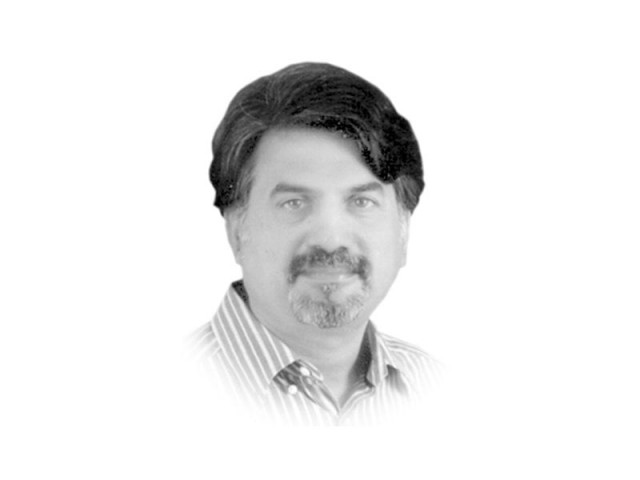Tides of change
Politicians cannot become a hindrance and prevent the state and the law that sustains the state from ruling

The writer is a retired lieutenant colonel of the Pakistan Army and is currently pursuing PhD in civil-military relations from the University of Karachi
Once again, a reminder was given to Pakistanis by PPP Co-Chairperson Asif Ali Zardari, the originator of this slogan, who said, “At the time of Benazir Bhutto’s martyrdom, I said Pakistan khappay, but there’s a limit to everything.”
What limit is the former president talking about here? Is there a red line in his mind which when crossed will result in him not raising this slogan anymore? Should we Pakistanis feel pride, anger, guilt or shame on our former president’s remarks?
Mr Zardari also stated: “Stop dishing the dirt at us. There will be a domino effect if we started your character assassination.” Assuming he was addressing the military establishment and this obviously is not a wrong assumption, the former president has finally publicly thrown a ‘political slur’ at the military leadership. This can have resounding consequences for the ongoing operation against criminals of all kinds in Karachi.
The state of Pakistan now has obvious choices. It can brush aside the political outburst by Mr Zardari as the tirade of a leader of a dying political party and go ahead with a deep and intense commitment against criminals in Karachi or it can first proceed against those whom Mr Zardari threatened in his speech. We must, for once, stop living lies before we lose the very state that wants to keep peace and enforce laws. General Raheel Sharif’s predecessors, former military leaders, have been targeted endlessly by the media for the wrongs they committed during their tenures. In his speech, Mr Zardari said that he “spent five years of his life in jail, but the ‘brave commando’ (Musharraf) doesn’t have the heart to go to jail for as short a period as three months”.
The people have clearly seen how the general has avoided facing the charges pending against him in the courts on the grounds of poor health. Is it not time now that General (retd) Musharraf stopped avoiding the notices from the courts trying him for over two years for the sake of his own slogan “sab say pehlay Pakistan”? I believe he needs to either win or lose his final battle in the Pakistani courts if he wants to strengthen, not only the hands of the institution that he once led, but also create the conditions and circumstances for the beginning of a new Pakistan that all of us want.
If establishment leaders of the past, who committed grave mistakes are not held accountable first, including those who have accepted their involvement in influencing and manipulating the country’s electoral process in the past, the political leadership of this country, in the words of Mr Zardari, will keep reminding the establishment that “many skeletons would pour out of the cupboard the day I release my own list. Stop targeting us or we’ll turn everything upside down.”
Unfortunately for the establishment as well as the politicians, Mr Zardari’s ‘big mistake speech’ has put both the military and the political elite of the country in a tight spot. If the state does not react, this might generate the impression that the Pakistani state has different rules for the elite and different ones for those it rules.
States exist and persist beyond the tenures of leaders. When Mr Zardari says “we are here to stay and we never retire”, he only needs to look at the fortunes of his party that has gradually been retiring from the political landscape of this country. He also needs to look at the fate of the many leading lights of the PPP, who lost their seats in the previous election. What politicians like Mr Zardari have failed to understand, and I hope his son does is, “before a polity can democratise, it has to provide basic order to society”. These are the words of Samuel P Huntington from his work, Political Order in Changing Societies.
When a society starts changing — and make no mistake that the Pakistani society with its educated middle class is not only changing but also rising to the contest — the prevalent rules, policies, systems, personalities and the kind of politics that some political parties use to benefit their own private interests as well as those of their families and friends, all start losing root. Actions of politicians who create rules and laws to sustain themselves and their parties in politics and in power start coming under question.
Politicians cannot become a hindrance and prevent the state and the law that sustains the state from ruling. If politicians become an obstacle in the way of this endeavour, the first business of the state is to establish and create order — if not with the help of politicians, then without them.
P.S. I spent five years writing my thesis on the “Role of army in politics — institutionalising civilian control over Pakistan’s military”. But unfortunately today I have been forced to agree not only with Huntington but also with Francis Fukuyama, the author of Political Order and Political Decay, when he says that “unless order is established in a society, democracy will never flourish”. Who will establish that order in Pakistan is the big question that I leave with the readers.
Published in The Express Tribune, June 22nd, 2015.
Like Opinion & Editorial on Facebook, follow @ETOpEd on Twitter to receive all updates on all our daily pieces.















COMMENTS
Comments are moderated and generally will be posted if they are on-topic and not abusive.
For more information, please see our Comments FAQ